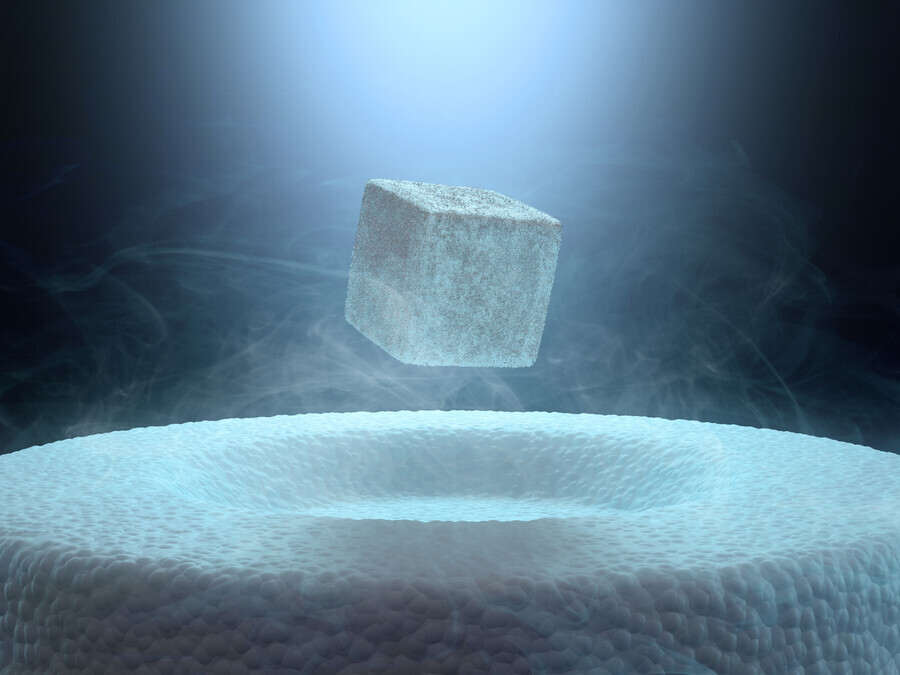hankyoreh
Links to other country sites 다른 나라 사이트 링크
Have Korean researchers successfully synthesized “holy grail” ambient superconductor? Scholars intend to verify

Following an announcement by Korean scientists claiming they synthesized a room-temperature superconductor, which rattled experts across the world, a scholarly association publicly expressed skepticism and revealed its plan to officially verify the claim.
On Wednesday, the Korean Society of Superconductivity and Cryogenics (KSSC) posted a notice on its website, stating, “As the authenticity of reports released domestically and abroad in the past few days has stirred controversy, and unverified claims are continuing to pop up, the KSSC, as the representative academic society in this field, intends to respond by forming a verification committee.”
The committee will be chaired by Seoul National University professor Kim Chang-young, who serves as associate director of the Center for Correlated Electron Systems at the Institute of Basic Science.
The controversy surrounding whether a room-temperature superconductor has been successfully synthesized started when researchers at Quantum Energy Research Centre, a private research institute in South Korea, posted a research paper regarding the matter on Arxiv, an open-access archive for scholarly articles that have not gone through a peer-review process, on July 22. In their abstract, the researchers shared that they “succeeded in synthesizing the room-temperature superconductor working at ambient pressure with a modified lead-apatite (LK-99) structure” for the first time in the world.
Superconductors are substances capable of conducting electricity without energy loss, as they are not resistant to electric currents. As such, they have been considered a “holy grail” capable of bringing about groundbreaking changes to scientific technology developed by humanity. But until now, superconductors that were successfully synthesized only exhibited superconductivity at extremely low temperatures or under immense pressure, limiting their practical application.
The publication of a research paper claiming that its authors synthesized a substance that demonstrates superconductivity in room temperature as well as in ambient pressure at this juncture garnered interest from not just scholars but also investors. Associated shares soared on the stock market, even prompting the creation of an investment theme for superconductors.
In its notice, the KSSC stated, “Based on data published through the Arxiv research paper and the video made public [by Quantum Energy], the substance described in the paper and depicted in the video cannot be considered a superconductor,” adding it intends to “make measurements for verification if Quantum Energy provides a specimen of [the superconductor] it produced.”
The KSSC also revealed that Seoul National University, Sungkyunkwan University and Pohang University of Science and Technology, among others, will be participating in its verification, announcing that research teams at Sungkyunkwan University, Korea University, and Seoul National University are separately conducting experiments aiming to reproduce the superconductor allegedly synthesized by Quantum Energy.
By Kim Jeong-su, senior staff writer
Please direct questions or comments to [english@hani.co.kr]

Editorial・opinion
![[Column] Will Seoul’s ties with Moscow really recover on their own? [Column] Will Seoul’s ties with Moscow really recover on their own?](https://flexible.img.hani.co.kr/flexible/normal/500/300/imgdb/original/2024/0513/5917155871573919.jpg) [Column] Will Seoul’s ties with Moscow really recover on their own?
[Column] Will Seoul’s ties with Moscow really recover on their own?![[Column] Samsung’s ‘lost decade’ and Lee Jae-yong’s mismatched chopsticks [Column] Samsung’s ‘lost decade’ and Lee Jae-yong’s mismatched chopsticks](https://flexible.img.hani.co.kr/flexible/normal/500/300/imgdb/original/2024/0512/3017154788490114.jpg) [Column] Samsung’s ‘lost decade’ and Lee Jae-yong’s mismatched chopsticks
[Column] Samsung’s ‘lost decade’ and Lee Jae-yong’s mismatched chopsticks- [Correspondent’s column] The real reason the US is worried about Chinese ‘overcapacity’
- [Editorial] Yoon’s gesture at communication only highlights his reluctance to change
- [Editorial] Perilous stakes of Trump’s rhetoric around US troop pullout from Korea
- [Guest essay] Preventing Korean Peninsula from becoming front line of new cold war
- [Column] The state is back — but is it in business?
- [Column] Life on our Trisolaris
- [Editorial] Penalties for airing allegations against Korea’s first lady endanger free press
- [Editorial] Yoon must halt procurement of SM-3 interceptor missiles
Most viewed articles
- 1Ado over Line stokes anti-Japanese sentiment in Korea, discontent among Naver employees
- 2[Column] Samsung’s ‘lost decade’ and Lee Jae-yong’s mismatched chopsticks
- 3Korean opposition decries Line affair as price of Yoon’s ‘degrading’ diplomacy toward Japan
- 4US has always pulled troops from Korea unilaterally — is Yoon prepared for it to happen again?
- 5Korean auto industry on edge after US hints at ban on Chinese tech in connected cars
- 6[Editorial] Yoon’s gesture at communication only highlights his reluctance to change
- 7[Correspondent’s column] The real reason the US is worried about Chinese ‘overcapacity’
- 8[Column] Will Seoul’s ties with Moscow really recover on their own?
- 9[Photo] Korean students protest US complicity in Israel’s war outside US Embassy
- 101 in 3 S. Korean security experts support nuclear armament, CSIS finds